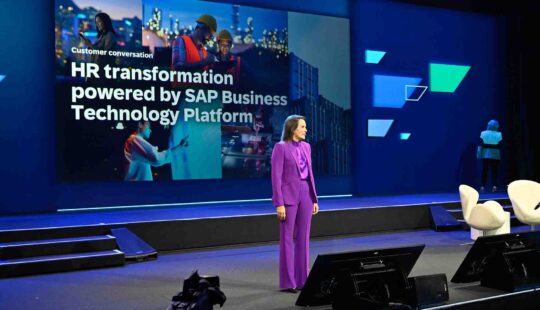Representation of women in leadership has been increasing in recent years. However, only about 25% of C-suite leaders and 40% of manager-level positions are held by women today. According to psychologists, biased perceptions of women in the workplace may be partially to blame, preventing women from obtaining and being successful in leadership-level roles. The inability to access higher levels of leadership is termed the “broken rung,” and there is still a lot of work to do to repair it.
Recently, a group of psychologists at the annual Society for Industrial & Organizational Psychology conference met to present emerging research on the broken rung. Caitlynn Sendra, Ph.D., experience product scientist at SAP SuccessFactors, who hosted the session, explained that because of the roles men and women historically held in society, our stereotypes around men and women can carry over into today’s workplace, even if not intentionally. “Men are stereotypically thought to be agentic, direct, and task-focused – traits historically associated with leaders. On the other hand, women are stereotyped to be nurturing, communal, and community-focused,” explained Sendra. Although this has led women to be seen as less leader-like, Sendra presented original research on how this may actually give women leaders an advantage when it comes to influencing organizational culture.
Throughout the session, the researchers presented data on several different sources of potential bias around women leaders, including 360-degree reviews, “high-potential” programs, and feedback. For example, Dr. Martin Lanik, CEO of Pinsight, demonstrated that men are three times more likely than women to be identified as “high potential.” Additionally, Dr. Stefanie Mockler, co-founder of The Violet Group, showed data indicating that managers tended to “soften” their feedback to women. The message of the session was clear: businesses need to be proactive in removing this bias from people processes in order to level the playing field for women leaders.
The session ended with a discussion about what HR leaders can do to help reduce bias towards women leaders. Providing training on bias awareness and reduction was one solution provided by the researchers. HR technology was also called out as a key piece of the puzzle.
At SAP, we’re working with organizations of all sizes to help drive more equitable and inclusive HR strategies that empower equitable experiences for every employee, including women. With embedded features throughout SAP SuccessFactors Human Experience Management (HXM) Suite, our customers are provided with the tools they need to help detect and prevent unconscious bias while also gaining the insights required to make decisions that can cultivate a diverse and inclusive workforce.
Here are three examples of how organizations are using SAP SuccessFactors solutions to help solve for the broken rung and other systemic biases in the workplace:
Sanlam
Sanlam is one of the largest financial services groups in South Africa and believes building a diverse, future-ready workforce is key to becoming the unrivaled industry leader in Africa and to strengthening its position abroad. With 105,000 team members, including both permanent employees and contingent staff, Sanlam is committed to ensuring access and opportunity across its total workforce.
With SAP SuccessFactors solutions, Sanlam is bridging the gap between permanent and contingent workers by providing a consistent experience for all workers. With visibility into the total workforce, management can identify skill gaps and offer all workers development opportunities that match future priorities. And with group-wide analytics, Sanlam’s leadership can set and actively track targets around race, gender, and disability.
“We have all the information we need at the drop of a hat,” said Ronel Pfotenhauer, SAP SuccessFactors portfolio product owner, Sanlam Life Insurance Limited. “For instance, we can report on the number of Black, African females with five years of experience and an MBA as potential candidates for a leadership role, with SAP SuccessFactors solutions acting as a type of internal recruitment portal.”
The University of Toronto
The University of Toronto’s mission is to build a community where academic and learning opportunities are given to every member of its community, including 12,000 full-time and 14,000 part-time employees across three campuses. Its recent work on the anti-Black racism task force and similar initiatives to do with anti-semitism and anti-Asian racism demonstrates the organization’s commitment to ensuring the principles of equity, diversity, and inclusion are deeply embedded in the fabric of everything it does.
With SAP SuccessFactors solutions, the University of Toronto is bringing a consistent look and feel to the employee experience, providing comprehensive learning programs and empowering people leaders to create the conditions for all talent to thrive. Watch this video to see how.
MOD Pizza
MOD Pizza is dedicated to making positive social impacts in the lives of its employees and the communities it serves. The company strives to create a more equitable world full of opportunities for those who face barriers to steady employment, such as people formerly incarcerated as well as individuals with intellectual or developmental disabilities. It calls its community of employees the MOD Squad, and the MOD Squad is 10,000 employees strong and growing along with the company.
With SAP SuccessFactors solutions, MOD Pizza has redefined the value of HR data, processes, and experiences – putting the MOD Squad at the heart of its business success. All candidates and new hires are provided with a welcoming experience to help them feel supported and prepared. All employees are provided with on-demand digital training to encourage continuous learning and growth. And with multiple touchpoints to gather sentiment feedback, MOD Pizza can quickly identify areas for potential improvement.
“SAP’s dedication to people sustainability struck a chord with us. This focus continues to show us that SAP solutions are the right choice for MOD Pizza because they’re designed to create a fair future full of opportunities for our employees,” said Tara Gambill, senior director of Enterprise Systems, MOD Pizza LLC.
Carrie Klauss is global director of Solution Marketing at SAP SuccessFactors.



